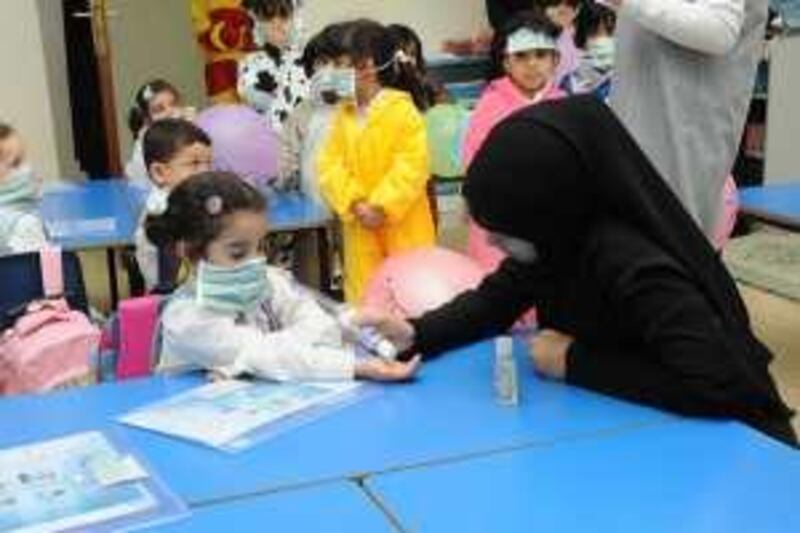ABU DHABI // Infectious diseases are being under-reported in the UAE and Middle East, potentially putting lives at risk, experts warned yesterday. Dr Nawal al Kaabi, a consultant and division head of paediatric diseases at Sheikh Khalifa Medical City, said heavy workloads and a lack of awareness among health professionals were primarily to blame.
There are no nationwide statistics on infection rates in hospitals or the community. Individual hospitals or emirates may gather their own figures, but there is no way for them to be compared to identify problems, Dr al Kaabi said. "We are definitely under-reporting in the UAE and Middle East," she said. "Public health bodies need to be aware of any problems and if we do not report it, by the time they learn about it, it might be too late."
A prime example is meningitis, a contagious and deadly spinal infection. "If the first case is not reported the public health might only learn about it when there are several cases, here survival might be less," she said. Speaking after her presentation at the Abu Dhabi Medical Congress, Dr al Kaabi emphasised that improved reporting would save lives, as some of the most severe infectious diseases can be prevented by vaccination.
"Having the public health body aware of any diseases, especially if it is preventable, which most of them are, would mean a vaccination programme could be put in place." Better reporting would also help the country draw up better public health policy, she said. One of the other key factors is enforcement of existing policies. Emirates' health authorities each have infection control policies, while federal laws also govern the reporting of certain diseases, such as hepatitis and HIV/Aids.
The Ministry of Health warned private hospitals in June that they would face legal action if they failed to report swine flu cases. Dr al Kaabi said many factors contributed to under-reporting but the main ones were workload and awareness. "Physicians see many patients every day, so it is sometimes very hard for them to do all the reporting, and they may even forget," she said. "The other thing is maybe people are not as aware as they should be about what the reportable diseases are. They are not always sure what they have to report."
As well as better enforcement, professionals say the situation could be improved in a number of other ways. Hospitals could employ someone to review admission information, Dr al Kaabi said, and ensure all infectious diseases were reported to the relevant authority. The same could apply to the laboratory staff. Abu Dhabi has made efforts recently to introduce electronic medical records. Daman, the national insurance company, only accepts electronic claim forms, and certain hospitals have already started to transfer their patient files to computer.
The Ministry of Health announced last year that it would introduce the Wareed system, which would electronically link all the hospitals and clinics in the Northern Emirates that fall under its jurisdiction. The system is still implemented in only a small number of hospitals. Dr al Kaabi said the introduction of electronic medical records could be used to tighten up the procedures for reporting infectious disease.
"If all the files are electronic, there could be a system where a warning or reminder goes off when an infectious disease is diagnosed. "This could be linked to the health authority and would not need the staff to do anything." Shamiso Fred, president of the Association of Professionals in Infection Control and Epidemiology in the GCC and chair of the pandemic committee at SKMC, said infectious diseases and infection control in the region was a "closed book" for many years.
The H1N1 pandemic, she said, was a good test as it opened many people's eyes to the importance of the issue. She attributed the lack of reporting to the high turnover of medical staff and a lack of unified guidelines. "Recently there have been quite a lot of changes and the situation is improving," she said. Ms Fred urged health bodies across the region to introduce comprehensive guidelines on a par with international standards.
Another doctor who works in a government hospital said health authorities should concentrate more on enforcing reporting rules for the "more common" infectious diseases, rather than diseases such as TB and HIV/Aids that can lead to deportation. "It is about where you focus energies," he said. "They are very strict about things such as HIV but do not seem as concerned with other diseases, so maybe some people think it does not matter?"
The Abu Dhabi Medical Congress was opened yesterday by Zaid al Siksek, the chief executive of the Health Authority-Abu Dhabi. The congress, which concludes tomorrow, was expected to attract more than 100 exhibitors from 20 countries. munderwood@thenational.ae





